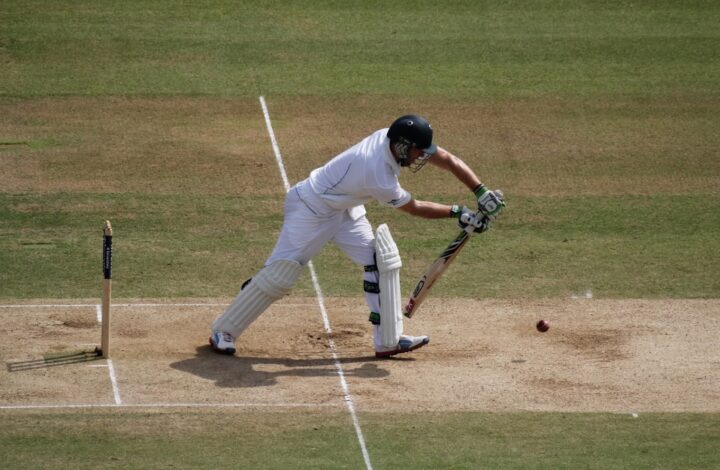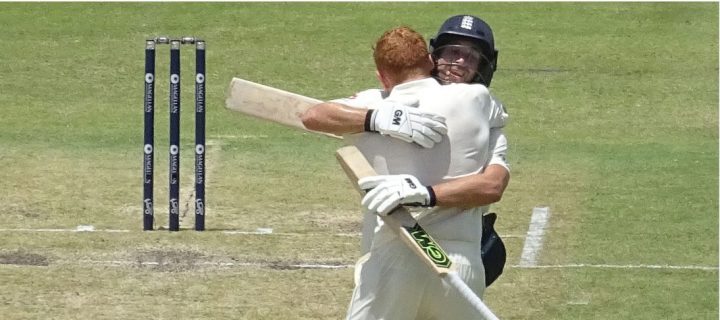Here’s James Ogden with his latest piece on Keaton Jennings, who could be emerging as England’s first ever Asia specialist …
When Keaton Jennings was selected for the upcoming winter tour of Sri Lanka, the response was typically, and some would say understandably, negative. Of all the openers tried in the past decade to replace Andrew Strauss and the now recently retired Alastair Cook, none have received as much scorn as the former South Africa under-19’s captain.
Maybe it’s his rigid stance and unattractive stroke making, or the fact that in home conditions he has been unable to find consistency. However, with two centuries to his name – more than Adam Lyth, Mark Stoneman, Alex Hales and equal in number to Rory Burns – are people being too harsh on the Johannesburg native?
The first thing to acknowledge about Jennings is that when he was selected as injury replacement for Haseeb Hameed, he was heading to India on the back of some incredible numbers. In the 2016 county championship season Jennings scored 1548 runs at an average of 65 – numbers made even more special by the fact he was playing his home games up at Durham against Division 1 attacks. The numbers were hard to ignore and he deserved a call up. He even started well, with a debut hundred and a fifty in his second Test. However, back in England against South Africa (and the moving ball) Jennings struggled mightily and was rightfully dropped.
Herein lies the problem with Jennings. When playing in England, where the majority of fans saw him live for the first time, he simply does not look up to international standard. Yet his numbers do not suggest he cannot be a great opener in English conditions. His career average of 33 might be underwhelming, yet a year scoring over 1500 runs for Durham is no mean feat. Furthermore, when Jennings was recalled for a second time in 2018, it was off the back of a promising start for Lancashire, where he had scored over 700 runs at an average of 47. Jennings can play in England, he’s just yet to show it on the international stage.

The second, and much more prominent point to make when discussing Jennings recent selection, is his statistics in the subcontinent. In 5 matches in either India or Sri Lanka, he’s scored 400 runs at an average of 44, including 2 centuries. To put that into perspective, Joe Root has played 11 matches in the subcontinent, scoring 911 runs at an average of 43, also including 2 centuries. Jennings has clearly proved his ability to play in spinning conditions, where his limited footwork actually seems to help him play the spinning ball late.
In an era of unprecedented innovation, perhaps Jennings is the first of a new breed of England cricketer – the spin specialist. Perhaps this is even something to be encouraged. England have often struggled to bat on turning wickets and Jennings is probably England’s best player of spin since Alastair Cook in his prime. This is something he should be proud of – a leader in a skill that many English players lack.
To make my self clear, I do not for one second believe Jennings is a long-term solution to England’s batting at the top of the order. However, the disgust many expressed at his recall for Sri Lanka was unwarranted. His Test average of 25 is of scant difference to the likes of Malan and Hales, whom many feel were discarded too soon. Jennings also has more Test centuries than those two players combined.
Although the South African born opener may well be the spare batsmen in Sri Lanka, his skill and experience at both Test and Lions level will surely benefit the squad. His help and advice might also help Zak Crawley and Dom Sibley who are two younger batsmen with very little experience in sub-continent conditions.
England’s horses for courses model has been a huge success in white ball cricket. So why not move forward with it in the Test arena? Jennings may never play a Test in England again, but he certainly has plenty to offer the team going forward.
James Ogden








It’s rather ironic that in this age of bits and pieces cricketers, where specialisation is being put to one side in favour of versatility, much to the chagrin of most on this blog, that when a player maybe selected for a specialist purpose we still decry that selection.
Horses for courses, when conditions vary so widely the world over, maybe the way to go if there’s an obvious choice. We already lean to this with spin selection out there so why not with batsmen. After all at this level the prime object of a test series is to win it, not give promising youngsters experience.
In this age of all year round international cricket having larger squads to select from must be of help to players recharging their batteries, rather than picking the usual suspects every tour, Anderson being a case in point here.
“England’s first ever Asia specialist …”
John Lever says hello!
“in home conditions he has been unable to find consistency”.
He’s failed pretty consistently!
“with two centuries to his name – more than Adam Lyth, Mark Stoneman, Alex Hales and equal in number to Rory Burns”.
Also one more than Jos Buttler.
” Jennings can play in England, he’s just yet to show it on the international stage”.
Based on some creative stat-mining from one and a bit seasons. There are plenty of Test class batsmen knocking around by this standard.
“In 5 matches in either India or Sri Lanka, he’s scored 400 runs at an average of 44, including 2 centuries”.
5 matches is a small sample size to conclude his the master of Asia. He hasn’t faced Yasir in UAE/Pakistan or Shakib in Bangladesh. His hundred in India was when nobody had had a chance to study his technique and in a very high scoring series (I think for memory five England batsmen averaged over 40 despite losing heavily). The red-ink century against SL was the kind of third innings’ runs that get derided if David Warner makes them.
It isn’t the ugliness of his runs or his South African origins that produces the reaction against Jennings’ selection (from me, anyway). It’s the suspicion that he’s been selected on “character” rather than ability or results. For some reason, his face fits and he gets chance after chance.
A bit unfair to Lever, as he was a decent bowler on home soil too. What wouldn’t we give for a quartet like Willis, Old, Lever and Hendrick now.
Yes, Simon–the problem with a small sample size is that it conceals a lot. In Jennings’s case, what it conceals is that the pretty-looking average is swayed unduly by one not-out hundred in a way that it wouldn’t be if he’d played 20 tests there, and that his median scores even in Asia are 13 and 26– reflecting his overall average, more or less. (If I recall correctly, in his other hundred he was dropped on 0, a chance which if taken would instantly reduce his average to not much more than 30 in Asia).
I actually don’t mind his selection for this particular tour, because I can’t think of anyone better for the role who’s available–would be even less impressed, for example, with picking Bracey, who also averages about 33 in Div 2. Two points though: first it’s a damning indictment of the strength of England’s test batting, and second, this kind of selection requires both ruthlessness and discipline from the selectors if he’s successful in Asia. that is to say, even if he scores another 400 runs in two tests in Asia, it might qualify him for next year’s tour of India but absolutely not for the Ashes.
As you imply, there’s a reason he averages 33 in f-c cricket–which is nowhere near good enough to be a test cricketer, unless possibly you’re a very new player with a lot of potential (Crawley, say. Even then I was underwhelmed by that selection, even though it’s turned out OK so far). Jennings is not that player–he’s almost 28.
Having once been a follower of baseball – I agree with the main point that it ought to be a reasonable, even routine, option to pick batters (as well as bowlers; eg. dropping a seamer and playing two spinners at the SCG is normal) to take into account opposition and conditions.
On the other hand, cricket is more of a team game than baseball – and the best teams have always been ones with settled personnel (and at least decent, if not great, captains). So ideally most of the team should be stable, but a minority could be specialists for conditions etc.
However, when it comes to Jennings, I’m not sure whether I believe the reasoning – to me, it sounds like more of an excuse than a reason to pick someone who the selectors want to pick for some other reason; and that if Jennings does well against spin in Sri Lanka, then the selectors (secretly) intend pick him again this summer against seam under English conditions.
The fact that Jennings had a good FC season is irrelevant, as indeed is high First Class averages when someone has had a good run for England and averaged way-too-low; as evidenced by Ramprakash.
Ramprakash was unlucky in that he often seemed to come up against a Windies attack that the likes of the county circuit could not replicate. This is where stats are misleading as his average was pretty low, yes, but time spent at the crease accumulating his twenties and thirties was considerable and I don’t remember many of his colleagues surviving as long and often as he did. The problem with facing an entire attack of quickies is that there is no respite, once you’ve played off one another just as quick takes his place. As number three his duty was to hang in there whilst the stroke makers upped the run rate, so he did better than his stats suggest in this regard.
Overall considering his technique, he did have I admit a disappointing test career, flattering to deceive.
I agree with picking Jennings for the Sri Lanka tour. It is like in the olden days when good players of fast bowling used to be chosen to play the West Indies.
Also, will the new 16 over tournament be postponed because of the virus?
In my living memory, starting with the late sixties, can’t say any policy we ever had of picking ‘good’ players of fast bowling against the Windies worked, as we still seemed to get rolled over every series.
As I seem to remember we would recover from 23-3 to 170 something all out. They would make 400+ and we would lose by an innings. This seemed to be the nearest we ever got to a policy against them.
..although maybe without David Steele et al that would have been recovering from 12-3 to get 70!
I do remember England getting over 400 against WI in the heyday of that bowling attack….problem was, WI had just got almost 700!
I also remember Bob Willis batting against them for three or four hours to save a match, so maybe this series’s batting specialist against spin ought to be Matt Parkinson!
The thing I most remember about our bespectacled hero was his sponsorship by a local butcher, where I believe he got a pork chop for every run he scored in that series. He’s probably still tucking into them now having, as I remember, made 3 hundreds and 3 fifties.
The other thing that sticks in my mind is him almost getting timed out at Lords having taken a wrong turn from the dressing room and missed the long room entirely. He always seemed the most unlikely sporting hero and strangely, given his outstanding performances in series against both the Windies and the Lillie and Thompson Aussies, seems almost a forgotten man now.
Actually, now you mention it, that’s a good example of the selectorial ruthlessness that was being talked about elsewhere in this thread. Having played so well against the Australian and WI pace attacks, wasn’t he left out completely of the india tour that followed, because he was thought not to be good against spin?
Btw, what did I say about Parkinson?! Comes straight into the game and immediately outscores nos. 6-10…
Parkinson is super underrated, im glad hes in the t20 side for the india series i just kinda wanted to see him with that red ball. the way that pitch was spinning in the second test i KNOW he coulda grabbed 3
Please send me more